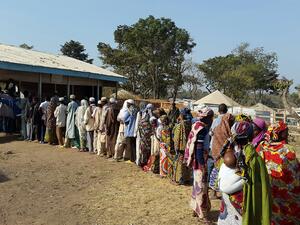Central African students pursue their studies in Chad exile
Central African students pursue their studies in Chad exile

Moussa with the sewing machine he was given by a staff member at a transit centre in N'Djamena. He will use it to earn some extra money as he resumes his law studies in Chad.
N'DJAMENA, Chad, May 12 (UNHCR) - When the latest round of conflict in Central African Republic erupted last December, 30-year-old Moussa was studying law at Bangui University.
"I wanted to defend people," he recalls six months later in neighbouring Chad, adding that as the conflict worsened, "I realized how helpless I was." Like thousands of others, including many students in higher education, he fled the country to escape the mounting intra-communal and religion-based violence.
Moussa ended up in Chad, which has received almost 100,000 people - mostly Chadians - fleeing from the Central African Republic, including close to 2,000 Central African refugees in eight transit centres set up in the capital, N'Djamena.
But despite the drastic upheaval in his life, Moussa was determined to find a way to continue his studies. "I really want to continue with my studies and I still plan to defend people, with words of course," chuckles Moussa, whose determination and single-mindedness has been rewarded.
He has been granted one of 67 scholarships offered to students from the Central African Republic by the government-run Polytechnic Institute for Engineering, Commerce and Administration (EPICA) in N'Djamena. UNHCR helped arrange these scholarships through consultations with EPICA. The study courses started recently.
The refugee agency will help with lodging; arrange transport to the EPICA halls of residence and provide basics such as blankets, mosquito nets, and hygiene items.
Moussa says that although he is "very happy about the [three-year] scholarship," he will need extra money for daily expenses. He thinks he has found a solution. "I used to support myself through tailoring in Bangui," he said, adding that a staff member at the Chagoua Transit Centre had lent him a sewing machine. His engaging character and energy is also sure to attract customers.
"I am training other refugees in the centre to help with the cutting, sewing and finishing touches," says Moussa, pointing to a woman ironing a colourful African garment. "Many of my trainees are also scholarship students. My plan is to set up a tailor's shop," he adds. "I like this work because I help my compatriots with their clothing needs and I train people to make a living."
Other refugee students on scholarships are studying subjects such as information management, business administration, sociology, hotel management, electronics and commerce.
UNHCR holds regular meetings to help orient newly arrived refugee students and to ensure that they are fully aware of the scholarship requirements, including following university rules, attending classes, studying hard and achieving good grades. It is also helping other students to become self-sufficient and looking at livelihood opportunities.
"It is important for us to seize this opportunity to not only promote refugee education, but also to explore, more deeply, the capacities, skills and interests of individuals. In this way, we will be able to help refugees regain their stability, independence and, most importantly, their dignity," says Aminata Gueye, UNHCR's representative in Chad.
There are currently more than 100,000 Central African refugees in Chad, including about 13,000 people who have arrived this year. Most of the refugees have arrived in the country via various border points in the south.
By Massoumeh Farman-Farmaian in N'Djamena, Chad








